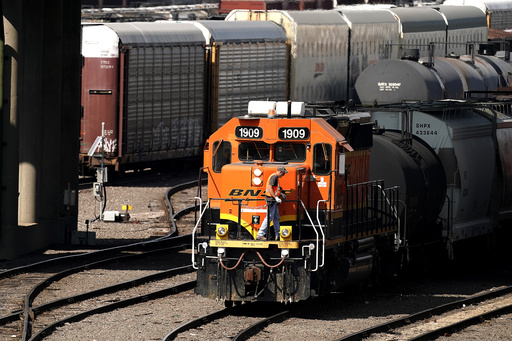
OMAHA, Neb. — The recent wave of contract negotiations—culminating in two new agreements—indicates a cooperative effort between major rail companies and their unions to avert the potential conflicts reminiscent of the national strike near occurrence two years prior.
Both parties are acutely aware that with Donald Trump as President-elect, a businessman advocate, the next administration would appoint those overseeing any unresolved contract disputes.
According to Todd Vachon, a professor at Rutgers School of Management and Labor Relations, “This situation may encourage unions and employers to engage in more thorough negotiations and to reach agreements more swiftly.”
However, achieving consensus among all workers continues to pose a challenge, especially as many employees express concerns about large-scale job reductions while witnesses to notably larger wage increases in other sector negotiations.
The current contracts for rail employees remain valid until July, but representatives from the National Carriers Conference Committee, which negotiates for railroads, announced their intent to seek an early resolution as talks began on November 1. On Wednesday, the announcement of two tentative agreements with the Transportation Communications Union and the Brotherhood of Railway Carmen marked progress.
Given the vital role railroads play in the national economy, both Congress and the president possess the authority to intervene in disputes due to the reliance of numerous businesses on these carriers for the transportation of goods and materials. The Railway Labor Act stipulates that unresolved disputes can lead to a special board of arbitrators appointed by the president to assess the situation and suggest a resolution, a scenario that unfolded in 2022 before a last-minute resolution averted a strike.
On Wednesday, the two unions that reached agreements, alongside several others from the twelve involved, had already begun forming deals with CSX, Norfolk Southern, and BNSF railroads even before official negotiations between these unions and rail carrier coalitions commenced. While some major railroads like CSX, Union Pacific, and CPKC are opting for individual bargaining, others have chosen to negotiate collectively.
Norfolk Southern CEO Mark George reflected on the past difficulties, stating, “We all experienced the consequences of this lengthy battle last time, which created significant anxiety and uncertainty among the labor force.”
Over the past two years, there has been an effort by the rail industry to improve quality-of-life conditions that previously threatened a strike back in 2022. Today, around 90% of the workforce has been granted paid sick leave—an initiative encouraged by officials in the Biden administration—while commitments have been made by most rail companies to better stabilize the erratic schedules of train crews who were previously subjected to unpredictable on-call demands.
These developments have generally improved the relationships between freight railroads and the various unions, though tensions remain at times. Jeremy Ferguson, the president of SMART-TD, the largest union representing conductors, remarked, “Significant progress has been made in the past two years.” Nevertheless, some employees continue to feel overworked and undervalued, especially in light of recent employment cuts that focused on operational efficiency.
Joe Hinrichs, CEO of CSX, has pioneered initiatives like paid sick leave and other measures to enhance employee morale and satisfaction, expressing optimism about the ongoing negotiations. “We’re in a significantly different situation compared to two years ago,” Hinrichs said, adding, “Recent discussions have allowed both sides to reconsider how we can avoid the dissatisfaction of the last round.”
Numerous early contracts have been ratified recently, coming shortly after initial announcements during a labor dispute that briefly impacted Canadian National and CPKC railroads. However, more recent agreements proposed offers of 18.8% increases, along with enhanced vacation and health benefits over five years, have been rejected by workers. This comes on the heels of larger wage hikes secured by workers at Boeing and East Coast ports after their strikes.
Josh Hartford, representing the Machinist Union’s District 19 rail division, noted that the timing of CSX’s deal coinciding with significant raises for longshoremen left insufficient time for workers to evaluate its benefits amidst mounting dissatisfaction. According to Hartford, “Morale remains low” across many rail companies due to prior lay-offs, fostering a sentiment among workers that they could potentially obtain better terms through prolonged negotiations. This belief has led conductors to reject all recent proposals while the Brotherhood of Locomotive Engineers and Trainmen has withheld their support for early agreements. Furthermore, the third-largest union representing track workers has shown divided stances on contracts they have reviewed.
Reaching consensus among all unions appears to be a daunting task. The Brotherhood of Locomotive Engineers and Trainmen is currently engaged in litigation with Union Pacific over promised scheduling improvements, while SMART-TD is progressing to arbitration concerning scheduling issues and crew size matters at both Union Pacific and BNSF.
Eddie Hall, president of BLET, emphasized caution, stating, “We weren’t going to rush into agreements that fail to adequately address our members’ needs.” He cited upcoming changes such as the growing implementation of remote-controlled trains and increasing train lengths amidst ongoing job reductions as significant concerns.
The urgency remains for unions to reach settlements, especially as the Biden administration’s influence dissipates, warns Victor Chen, a labor-focused sociologist at Virginia Commonwealth University. He predicts that the future Trump administration will likely revert to strategies that may impede union progress in bargaining, urging unions to remain cognizant that the White House may not provide the same level of support as it did under Biden.
